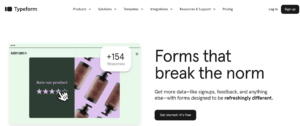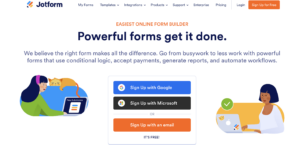Typeform vs Jotform — Which is the Best Tool in 2024?

Kate Williams
Last Updated: 30 May 2024
16 min read

Need a simple way to create online surveys and quizzes? We’re comparing Jotform and Typeform to help you decide which is best for you.
Whether you’re a budding entrepreneur, a seasoned marketer, or just looking to gather insights, the battle between Typeform and Jotform is one you can’t ignore. With a focus on usability, customization, integration capabilities, and pricing, this detailed analysis aims to equip you with all the information you need to make an informed decision.
In this blog post, we’ll cover the following topics:
- Basic Overview:Typeform vs Jotform
- Features:Typeform vs Jotform
- Design & Customization: Typeform vs Jotform
- Integrations: Typeform vs Jotform
- Pricing: Typeform vs. Jotform
- Pros & Cons: Typeform vs Jotform
- Final Decision
- Looking for alternatives to Jotform and Typeform?
But before that, Let’s ensure we are all on the same page!
What to Look for in an Online Form Builder
- Ease of Use: Look for a user-friendly interface that allows quick survey creation, distribution, and management without needing extensive training.
- Customization and Flexibility: The tool should offer a wide range of question types, customization options for branding, and the flexibility to create various survey formats.
- Integration Capabilities: Ensure it integrates smoothly with other business tools (CRM, email platforms, etc.) to streamline workflows and data analysis.
- Analytical Features: Essential for extracting insights, the tool should provide a comprehensive dashboard for real-time data tracking, analysis, and reporting capabilities.
Are you interested in discovering an alternative to Typeform and Jotform? Give SurveySparrow a try!
Sign Up for Free!
14-day free trial • Cancel Anytime • No Credit Card Required • No Strings Attached
1. Typeform vs Jotform: Basic Overview
Let’s kick things off by giving a brief overview of our contenders before diving into the comparison.
What is Typeform?
Typeform is a web-based platform designed to help users create interactive and engaging forms, surveys, quizzes, and more, with a focus on user experience and design. Unlike traditional form builders, Typeform emphasizes a conversational interface, where questions are presented one at a time, mimicking a more natural, human-like interaction.

Typeform offers a variety of customization options, allowing users to tailor the look and feel of their forms to match their brand, including images, videos, and custom layouts. It also integrates with various third-party services, such as CRM tools, email marketing platforms, and payment processors, to streamline workflows and data management.
What is Jotform?
Jotform is an online form builder that allows users to create custom forms for various purposes, such as surveys, registrations, contact forms, order forms, and more, without needing any coding skills. It offers a user-friendly interface where you can drag and drop form elements to build your forms.

Jotform supports a wide range of integrations with other platforms and services, including payment processors, CRM systems, cloud storage services, and email marketing tools, making it versatile for businesses and individuals alike. It also provides various templates to get started quickly, alongside features for customizing the design of your forms to match your branding.
Now that we have a clear understanding of what Jotform and Typeform are let’s dive into the detailed comparison of their features.
2. Key Features : Typeform vs Jotform
Typeform
Typeform is renowned for its ability to create engaging, user-friendly forms, surveys, quizzes, and more, thanks to a suite of powerful features. Here are the key features that set Typeform apart:
#Conversational User Interface
Typeform’s standout feature is its conversational, one-question-at-a-time approach to form design, which helps keep users engaged and increases completion rates.
#Highly Customizable Designs
Users can customize their forms extensively, with options for adding images, videos, and custom themes, allowing for a seamless integration with brand aesthetics.
#Logic Jumps
This feature enables personalized form experiences by changing what question appears next based on how the previous question was answered, allowing for complex, tailored pathways through the form.
#Wide Range of Templates
Typeform offers a diverse collection of templates designed for various needs, from customer feedback to event registration, making it easier for users to get started.
#Integration Capabilities
It integrates smoothly with many third-party services, including Google Sheets, Mailchimp, and Slack, automating workflows and enhancing productivity.
#Reporting and Analytics
Typeform provides detailed analytics and reporting tools that help users understand how their forms perform, track completion rates, and analyze responses for better insights.
#Responsive Design
Forms created with Typeform are automatically optimized for desktop and mobile devices, ensuring a great user experience regardless of how respondents access the form.
#Payment Collection
It supports integration with payment gateways like Stripe and PayPal, enabling easy collection of payments directly through forms.
#File Uploads
Respondents can easily upload files through the form, especially useful for applications requiring document submissions.
#Security and Privacy
Typeform is committed to data security and privacy, implementing features like SSL encryption to protect the information collected through its forms.
#Jotform
Jotform stands as a robust and versatile online form builder, catering to a wide array of needs from simple contact forms to complex surveys and registration forms. Here are the key features that make Jotform a go-to solution for many users:
#Drag-and-Drop Form Builder
Jotform’s intuitive drag-and-drop interface makes it easy for anyone to create forms quickly without any coding knowledge.
#Wide Range of Templates
Typeform offers a vast library of customizable templates for various uses, enabling users to get started with their forms quickly.
#Advanced Form Fields
It Supports various form fields, including text inputs, dropdowns, checkboxes, file uploads, and even signature fields, to collect different types of information.
#Conditional Logic
This feature allows for the creation of dynamic forms that change based on user responses, making forms more interactive and tailored to individual users.
#Integrations
Typeform integrations feature a plethora of integrations with popular services and platforms, such as PayPal, Stripe, Google Drive, Dropbox, and Zapier, facilitating seamless workflows.
#Payment Processing
Payment processing enables the collection of payments directly through forms, supporting various payment gateways for donations, subscriptions, and sales.
#Mobile Forms
All forms are optimized for mobile use to ensure a seamless experience for users on mobile devices.
#Security Measures
This platform provides robust security measures like SSL encryption to safeguard any sensitive information gathered through forms.
#Analytics and Reporting
It provides tools to analyze form submissions, monitor performance, and gain insights into user behavior and preferences.
#Collaboration and Sharing
It facilitates team collaboration with options to share forms and manage responses together and also allows easy sharing of forms via email, social media, or embedding in websites.
3. Design & Customization
Typeform
Strengths:
- Conversational Interface: Typeform’s signature design feature is its one-question-at-a-time approach, making forms more engaging, aesthetically pleasing, and easier for respondents to navigate.
- High Customizability: Users can extensively customize the look and feel of their forms, including fonts, color schemes, and backgrounds, to ensure alignment with their brand identity.
- Rich Media Integration: Typeform allows for including images, videos, and GIFs within forms, making it possible to create highly interactive and visually appealing experiences.
- Templates: Offers a wide array of beautifully designed templates that can be customized to fit various needs, ensuring users have a strong starting point for their designs.
Limitations:
- The highly stylized approach might not suit all forms, especially those requiring a more traditional, information-dense layout.
Jotform
Strengths:
- Flexibility: Jotform provides a drag-and-drop form builder that offers a high degree of flexibility in form design, allowing users to place form elements exactly where they want them.
- Theme Store: Offers a vast collection of form themes and templates, which can be further customized or used as is, catering to various uses and styles.
- Advanced Form Fields: Supports various form fields, including widgets that add functionality like signature capture, appointment scheduling, and more, enhancing the form’s utility without compromising design.
- Custom CSS Injection: For users with web design experience, Jotform allows the injection of custom CSS, offering limitless possibilities for customization and branding.
Limitations:
- While Jotform offers extensive customization options, achieving the same level of design elegance as Typeform’s conversational forms may require more effort and design skill.
Comparison summary
- Typeform is best suited for users prioritizing engaging, story-like form experiences with a strong focus on aesthetics and user experience. Its design-centric approach makes it ideal for surveys, feedback forms, and quizzes that stand out.
- Jotform, on the other hand, excels in offering flexibility and functionality, making it a great choice for users who need detailed forms with specific functionalities. Its customization capabilities ensure that forms can be closely aligned with brand requirements, making it suitable for a wide range of applications, from business forms to event registrations.
4. Integrations
When comparing Typeform and Jotform, the scope and depth of their integration capabilities are crucial for many users, determining how well these form builders can fit into existing workflows and ecosystems. Here’s an overview of the integration capabilities for both platforms:
Overview
- Jotform: 400+ integrations
- Typeform: 100+ integrations
Typeform Integrations in Detail
Typeform focuses on providing smooth integrations with various software, enhancing its utility for creating engaging, conversational forms. Its integration portfolio includes:
- CRM Systems: Integrates with popular Customer Relationship Management (CRM) systems like Salesforce and HubSpot, allowing for direct data transfer and lead management.
- Email Marketing Tools: Offers connections to email marketing platforms such as Mailchimp, helping users automate their email campaigns based on form responses.
- Collaboration and Productivity Tools: Seamless integration with tools like Slack and Trello, facilitating team collaboration and project management.
- Payment Processors: Typeform supports integration with payment platforms like Stripe and PayPal, enabling e-commerce capabilities within forms for subscriptions, donations, and product sales.
- Data Management and Analytics: Connects with Google Sheets and Airtable for real-time data collection and analysis, plus Zapier for automating workflows across thousands of apps.
Jotform Integrations in Detail
Jotform prides itself on an extensive range of integrations designed to cater to various needs, from payment processing to project management. Its integration offerings include:
- Payment Gateways: Supports a wide array of payment processors, including PayPal, Square, Stripe, and Authorize.Net, making it versatile for e-commerce and donation collection.
- Email Marketing Services: Integrates with platforms like Mailchimp, Constant Contact, and ActiveCampaign, enabling users to grow their mailing lists directly from form submissions.
- Cloud Storage Services: Offers integration with Dropbox, Google Drive, and Box for easy file storage and management.
- CRM Platforms: Connects with Salesforce, HubSpot, and Zoho CRM, allowing for efficient lead capture and management.
- Productivity and Team Collaboration: Integrates with Slack, Asana, and Microsoft Teams, among others, to enhance team communication and workflow management.
- Zapier Integration: Like Typeform, Jotform integrates with Zapier, providing access to a vast ecosystem of apps for automated workflows and data transfers.
5. Pricing
Jotform Pricing Plans
| Plan | Features |
|---|---|
| Free | 5 forms, 100 responses/month |
| Bronze | $34/month – 25 forms, 1,000 responses/month |
| Silver | $39/month – 50 forms, 2,500 responses/month |
| Gold | $99/month – 100 forms, 10,000 responses/month |
| Enterprise | Custom Pricing – Custom solutions |
Typeform Pricing Plans
| Plan | Features |
|---|---|
| Free | Unlimited forms, 10 responses/month |
| Basic | $25/month – Unlimited forms, 100 responses/month |
| Plus | $50/month – Unlimited forms, 1,000 responses/month |
| Business | $83/month – Unlimited forms, 10,000 responses/month |
| Enterprise | Custom Pricing – Custom solutions |
6. Pros and Cons
| Criteria | Typeform | Jotform | Preferable For |
|---|---|---|---|
| User Experience | Conversational interface | Traditional form approach | Typeform for engagement |
| Design & Customization | Design-forward, highly customizable | Customizable with more control | Typeform for design; Jotform for control |
| Versatility & Functionality | Engaging forms | Wide range of uses | Jotform for versatility |
| Integrations | Essential services | Extensive library | Jotform for integrations |
| Pricing | Higher cost | More budget-friendly | Jotform for budget-conscious |
| Overall | Design and engagement focus | Functionality and versatility | Depends on project needs |
In essence, there is no one-size-fits-all answer. The best platform for you depends on your specific needs, the type of forms you’re creating, and the level of customization and integration you require. Both Typeform and Jotform are outstanding in their own right, and your choice should align with the goals and priorities of your projects or business.
Consider starting with the free versions of both platforms to get a hands-on feel for their features and functionalities. This direct experience can help you make a more informed decision that aligns with your unique needs and preferences.
Wait, not convinced, yet?
If, despite everything mentioned earlier, you’re still on the hunt for a superior online form builder, you’re in luck. I’ll explain why SurveySparrow is the ideal choice for you.
Why is SurveySparrow a Better Alternative?

AI-Powered No-Code Survey Maker: SurveySparrow utilizes AI to create engaging surveys and forms without coding skills, helping you make better decisions.
User-Friendly Interface: With a simple and intuitive user interface, SurveySparrow ensures a seamless experience for survey creators and respondents.
Conversational User Experience: SurveySparrow’s chat-like interface makes surveys engaging and easy to navigate, ensuring higher completion rates.
Report Savvy Dashboard: Access a comprehensive dashboard for insightful reports and analytics, empowering you with the data needed to make informed decisions.
Streamlined Single Page Forms: Simplify surveys with single-page forms for better user engagement and higher completion rates.
Higher Response Rates: Our mobile-friendly design and conversational approach lead to increased participant engagement and better response rates.
Diverse Template Library: Choose from 1000+ templates for surveys, feedback forms, and more, saving you time and ensuring professional design.
Seamless Integrations: SurveySparrow integrates effortlessly with a wide range of third-party applications, enabling you to connect your surveys with your existing workflow.
Cost-Effective: Enjoy premium survey features at a competitive price, making SurveySparrow a cost-effective choice without compromising functionality.
Dedicated Support: Our customer support team is committed to your success and is ready to assist you every step of the way.
Hassle-Free 14-Day Free Trial: Try SurveySparrow risk-free with a 14-day trial that requires no credit card details. Experience its features and benefits firsthand.
The Best Online Form Builder is Here
Try SurveySparrow for Free & Get up to 40% More High Response Rates!
14-Day-Free Trial • Cancel Anytime • No Credit Card Required • Need a Demo?
Wrapping up…
You can do wonders for your business with the right online survey tool in your arsenal. As we have been saying throughout the article, its effectiveness and results depend on how these tools are utilized.
In the Typeform vs. Jotform comparison, consider SurveySparrow as an option that caters to your specific needs. Explore each platform to determine the best fit for your survey and form-building requirements.

Kate Williams
Product Marketing Manager at SurveySparrow
Excels in empowering visionary companies through storytelling and strategic go-to-market planning. With extensive experience in product marketing and customer experience management, she is an accomplished author, podcast host, and mentor, sharing her expertise across diverse platforms and audiences.
You Might Also Like

Turn every feedback into a growth opportunity
14-day free trial • Cancel Anytime • No Credit Card Required • Need a Demo?




